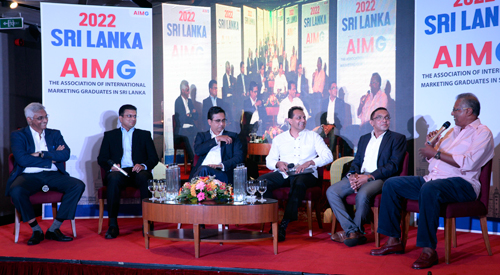Inconsistent policies deter foreign investors

The meeting in progress
Sri Lanka’s problem was not pandemic but a long- standing pre-pandemic problem that affected the country. But now the problem is different because the country has to face a recovery path of the economy. “When the Central Bank’s intervention wanes out how does the Treasury find the money? With the recovery, tourism will be able to find some money. But the problem lies much deeper than recovery as we have forgone economic reforms for a long period of time since 1977 and 1989,” said Senior Professor in Economics, University of Colombo Sirimal Abeyratne at a recent Association of International Marketing Graduates Sri Lanka discussion held at the JAIC Hilton Colombo.
He said Sri Lanka has completely forgotten reforms for 40 years for that matter.
The businesses that have been doing well have collapsed due to ad-hoc measures and policies being implemented. But businesses that many have not heard or seen have flourished in recent times. Foreign investment did not come to Sri Lanka owing to inconsistencies of conflicting policies of the state. Neighbouring countries meanwhile have done well during the pandemic to attract foreign direct investments to their countries to build up their reserves. Bangladesh has built up US$45 billion in reserves during the pandemic period, from $35 billion. Singapore and India have done the same in attracting FDI’s. But Sri Lanka’s reserves fell from $9 billion to $2.5 billion during the same period and have a big challenge to face. Crisis time is the ideal time to resort to economic reforms.
Referring to the financial crisis that happened in the US, 10 years ago, it did not affect Sri Lanka much as many investors knew about it and moved their money to South Asian region countries. There was $1 trillion capital outflows from wealthy countries to developing countries and a large part of it came to South Asia. That was the reason why it did not have an impact on Sri Lanka. During a recession capital moves faster as happened earlier.
During this period $1500 billion dollars moved every year from wealthy countries to developing countries. But before the world recovered fully from the recession, the COVID-19 pandemic hit the world economy causing a catastrophic blow.
But wealthy countries during the pandemic paid their affected citizens 10 percent of their GDP to cushion the cost of living and paid salaries of people who did not work. But Sri Lanka could only afford to pay 0.7 percent of the GDP to those affected during the pandemic However neighbouring countries in the region paid affected people 2.4 percent of their GDP. Despite the drop in tax revenue to off-set incurring expenditure the Central Bank had to print currency as done in other countries.
Chairman Jetwing Symphony PLC Hiran Cooray said he was happy to note that international tourism bookings were coming into the country having witnessed many disasters in the past like the Tsunami, the airport bombing and protracted war during the past few decades. The past 18 months was the worst period for him having worked in the touristm sector for 35 years. “What do I do when I have to manage a company with 3600 employees without an income to pay their wages during the past few years,” he asked.
Group CEO Dialog Axiata PLC Supun Weerasinghe said the challenge they face today is the chip sets storage that power everything they know today. This has a cascading effect on equipment in addition to the currency problems that are faced today. “Massive exposure to the global tech cycle and the commodity market is another challenge,” he said.
Dr. Rohan Fernando, Executive Director Aitken Spence said the problems they have are the policy inconsistencies of the state. The privatisation of plantations and the telecom sector were bold decisions taken 25 years ago that yielded results.
Hitad.lk has you covered with quality used or brand new cars for sale that are budget friendly yet reliable! Now is the time to sell your old ride for something more attractive to today's modern automotive market demands. Browse through our selection of affordable options now on Hitad.lk before deciding on what will work best for you!


